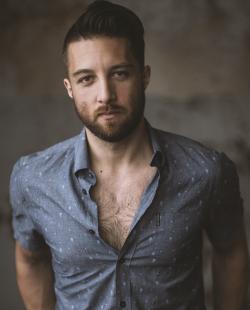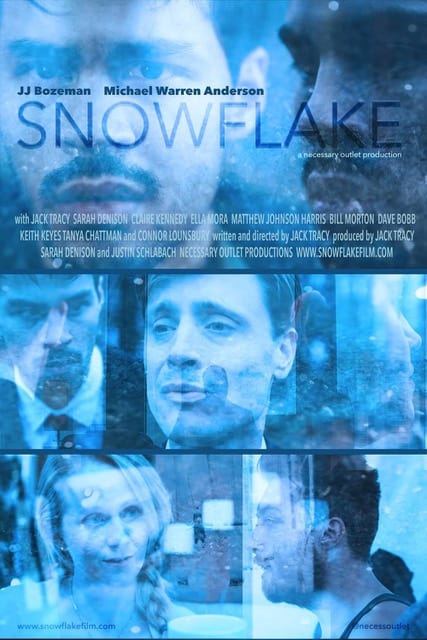
Making it’s world premiere at QFlix Philadelphia this weekend, Jack Tracy’s Snowflake was inspired by the 2016 presidential election and examines the election of a conservative dictator with an anti-gay VP through an LGBTQ lens. With his web series History entering it’s third season and more music and a podcast coming soon, Tracy found time to sit down with me to talk about the inspiration behind Snowflake, the third season of History, and we went deep on why at this time, predicting LGBT content is more important than ever.
Michael Cook: We’re overwhelmed by the negativity coming out of this administration on a daily basis. What made you want to dive even deeper into it and create a film like Snowflake around it?
Jack Tracy: Because it really was so cathartic. For me, right after the November 2019 election, my feelings were very similar to how the character Ethan is portrayed in the film. I was completely overwhelmed, I was calling anyone that I could call, my Congressman, Senator, the DOJ hotline, anyone. I was angry and disgusted, but as with anything that I have done, from my music to my web series to this film, for me in these times of emotional uncomfortability, I have to put it into work and into art somehow. It tends to lead to my best products, so I have put all of that into the script.
MC: You have characters that are diverse in terms of what kind of people are represented. Is that deliberate?
JT: For me, regardless of Snowflake, any production that I do based on LGBT content that I saw growing up, it is important to have as much representation as possible. That can be in the form of race, gender and shades of our community to get as much perspective as we can. The media that I grew up with was always filed with gay dudes, and that was fine, but there was little variety. For me, it is very important to provide that representation now.
MC: You included the character of Paul, who is a character who was directly affected by the AIDS crisis. Why do you think it was important to feature a character like that?
JT: One of the main goals of Snowflake was to show the intersectionality of our community. In a broader media, especially politically, the LGBT point of view is portrayed as a single point of view. We are grouped together as a single group and its almost like “this is the LGBT perspective or agenda”. Instead of having a political movie that had a certain agenda for specific groups, I wanted to encapsulate all of the varied opinions that might occur within the LGBT community. It is important for me to show both diversity in ethnicity and age, but also diversity of opinion. From Log Cabin Republican gays to the older generation who have already been on the front lines of protesting and knowing what it is to go up against governments the way that younger generations may not. When I was thinking of all of the different perspectives that I wanted to portray, the old guard and a character like Paul was definitely one that I wanted to show.

MC: Do you have trouble reconciling that someone can be a staunch member of the LGBT community, but also be a major Trump supporter?
JT: I don’t have trouble necessarily reconciling it, I just think that there are people who care about their community and care about their community, and then there are people who feel that they are the good ones and the acceptable ones, and who do not see a sense of community. I don’t have trouble reconciling it, because I can see that these are selfish and self interested people who care more about their paycheck. The character of Natalie in Snowflake has some lines in the show that people like that could definitely relate to, in terms of being able to pay to get around what she does not like. Basically, if they pass things that may impact all of you it won’t affect me, so I don’t give a shit. So it does not surprise me that within our own community we have selfish people like that as well.
MC: So you can understand having to distance yourself from people in our lives that have directly voted against and continue to support someone who is against our best interests?
JT: Many of my characters are based on interactions with people that I knew, and some of them I have distanced myself for various reasons. That is a common story, not just with gay viewers, but with everyone. I am sure everyone has an aunt or an uncle or someone that post 2016, they have had to distance themselves from.
MC: You also included a couple in the story that can be strongly interpreted as Mike and Karen Pence. Many people find them very fascinating as both political and faith based figures. How do you reconcile the fact that people who allegedly hold their faith so strongly can be so closely aligned with a person like the current White House resident?
JT: There are probably different justifications for different things I would say. There are people who have very strong views on very specific issues that probably view Trump as an instrument to bring about, even if they not agree with the way he conducts himself and despise him personally; a means to an end in a way. I think you have people who very clearly believe in the “love the sinner hate the sin” way of thinking, and they embrace him in the same way as they would a pastor who has solicited a prostitute. There are people who are white nationalists, and they don’t see any un-Christ like behavior in being that way, and feel we should be a “white Christian nation”. Religion is not based in fact or any provable truths, so people can really wrap it around whatever they want. If I had a book full of stories that were translated through the generations and I could point at it as my guiding authority, I can use it to justify whatever I want.
MC: Beyond Snowflake, you have worked with several web series as well, with History being the most recent and entering it’s third season.
JT: Yes! History is our most recent and most popular, releasing the third episode on Valentine’s Day. So far, it is my best reviewed work to date. We filmed it after Snowflake, and eight every project I develop my skills more, becoming a better editor and a better colorist, a better audio editor, things like that. Season 3 of History is definitely my most professional and best received work, and I am very happy with it.
MC: Web series vs a feature film,, what do you find are the most scary differences creatively?
JT: Well the biggest difference is with Snowflake my work in front of the camera is quite involved. I was able to devote much of my time to direction and cinematography. Wheras with History, I am a lead character and in almost every scene. Being able to just focus on one job on filming day definitely gave me the freedom to play and be a little bit more creative and not feel so pressed for time. Also, it is difficult with a web series, as they are twenty to thrirty minutes and it is more like a television show, with a lot of talking and things to keep you from looking away and vey dialogue driven. With a film, I try to do a little more cinematic and less things that are reliant on dialogue.
MC: So what can we expect next from you?
JT: We are starting to film a digital album next month, it is based on my second album which will be coming out soon. We also have a podcast, it is a drama called “Community” that takes place during the shooting at a gay night club, which I am very excited about.
MC: You are creating some great content that is so important to the LGBT community. How do you stay inspired to keep producing content like that?
JT: Because I truly don’t know what the other option is. If not this, what am I supposed to do? Am I supposed to sulk, surrender, despair, what? I was an attorney at a major New York law firm and just did not see myself in that light. I was able to get a five day a week job and after doing that for a year and appreciating my free time, I had to look at my time and decide what I was going to do. It really inspired me to start creating and the fan reaction and the continued growth of not just the audience, but of the people that I collaborate with is remarkable. I collaborate with the same actors, we are adding more people to the family, and just get bigger. Feeling that momentum inspires me to do more and more; you just let the wave carry you.
